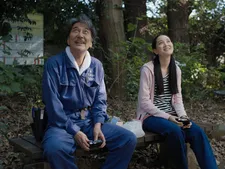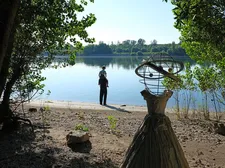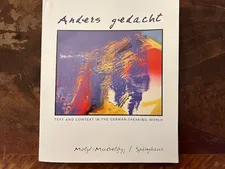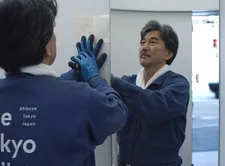 |
| Wim Wenders, the director of Perfect Days and Anselm with Anne-Katrin Titze on the connection between Hirayama, played by the extraordinary Kôji Yakusho and Anselm Kiefer: “They both love nature.” |
In the first instalment with Wim Wenders, the day after he presented Paris, Texas (screenplay by Sam Shepard, starring Harry Dean Stanton and Nastassja Kinski) at the Wim Wenders: An American Cinematheque Retrospective in Los Angeles, we discuss the connection between his Oscar shortlisted entry from Japan, Perfect Days (co-written with Takuma Takasaki, starring Cannes Film Festival winner of Best Actor Kôji Yakusho), and Anselm (Anselm - Das Rauschen der Zeit), his documentary in 3D on Anselm Kiefer, both shot by Franz Lustig.
 |
| Wim Wenders on Hirayama (Kôji Yakusho): “He only reads one book and when he’s finished he puts it on his shelf …” Photo: MASTER MIND Ltd. |
We start out by remembering the conversation I had with Wim at the reception for his 2003 Pictures From The Surface of the Earth photograph exhibition at the James Cohan gallery in New York, where he told me his favourite fairy tale was Hans im Glück (Lucky Hans). We continue on about trees and Komorebis, the great importance of Paul Celan for Kiefer and the world, a book I worked on with colleagues at Barnard/Columbia University (Anders Gedacht, Houghton Mifflin, 2005), Ingeborg Bachmann’s courage, minimalism and collecting, the bookseller (played by Inuko Inuyama), humming and sweeping, and Patti Smith putting the name up there.
In Perfect Days, we see the city from above, the trees from below and then settle into one man’s morning routine. A bit like Alain Delon in Jean-Pierre Melville’s Le Samouraï, Hirayama has his rituals that include spraying his tree saplings with water, getting a wake-up drink for himself from the vending machine in his courtyard, and choosing the right cassette tape and song to listen to in his car to work. Sometimes it is House of the Rising Sun (by Eric Burdon and the Animals), sometimes the lyric Sitting in the Morning Sun (from (Sittin' On) The Dock Of The Bay by Otis Redding) that fits his mood. His special belt has many keys and he looks elegant with his towel just so and his overalls and his dignity.
Younger colleague Takashi (Tokio Emoto) hates the early shift. The first words we hear our hero speak are addressed to a little boy wearing yellow, who seems to be lost. “What’s wrong? Hirayama asks. When the frantic mother arrives, she completely ignores the toilet cleaner, but the boy waves back, as they pass the sign where crying children are to be parked, because he knows what is valuable and what isn’t.
During lunch break in a beautiful park, the protagonist finds a bench to have a sandwich. He looks up at the trees and the sky and unpacks his little Olympus camera to take a few black and white shots before bowing to a nearby monk. Then he carefully selects a sampling from a tree and places it in a tiny self-made paper bag. Every interaction carries meaning, and that includes the wordless recognition of the other as a fellow human. Hirayama is aware of the homeless man’s (Min Tanaka) routine and grateful for the book clerk’s comment that Patricia Highsmith made her realise that fear and anxiety are two different things.
 |
| Anselm Kiefer painting with fire in Anselm Photo: courtesy of Road Movies |
The question if shadows get darker when they overlap is staged by Wenders as an encounter with a stranger who, like Peter Pan, still is aware of the many things he does not know. There is wisdom and humility in our hero’s smile when it edges onto tears. Komorebi, the sunlight filtered through trees, is a goodbye gift in the shape of a word definition that leaves us as light and refreshed as Lucky Hans on his way home. Or, as Kakuzō Okakura wrote in The Book of Tea, “Let us dream of evanescence, and linger in the beautiful foolishness of things.”
From Los Angeles, Wim Wenders joined me on Zoom for an in-depth conversation on Perfect Days and Anselm.
Wim Wenders: Hey, Anne-Katrin, how are you?
Anne-Katrin Titze: Hi, Wim, good to see you!
WW: Likewise, good to see you again. It’s been a couple of years.
AKT: It has! You’re in L.A.?
WW: Yup, last day. I worked here for a week on the promotion for Paris, Texas and I’m leaving now, in an hour.
AKT: Thank you for taking the time. After watching Perfect Days and Anselm and thinking about both, I was reminded of something you said, even longer than a couple of years ago. At the opening of your gallery exhibition, Pictures from the Surface of the Earth, there was a lunar eclipse going on and you told me that your favourite fairy tale was Hans im Glück, Lucky Hans.
WW: Yeah.
AKT: The tale came to mind in connection to these two movies.
WW: I’m Hans im Glück right now.
AKT: I didn’t think about it that way. Your protagonist in Perfect Days is in a way Hans im Glück.
 |
| Hirayama (Kôji Yakusho) on his favourite bench with Niko (Arisa Nakano) looking up at the trees Photo: MASTER MIND Ltd. |
WW: He is, yes! He is living in bliss, permanent bliss.
AKT: Another link between your two latest works that I never connected with your films before - you just mentioned Paris, Texas - are trees and the forest. People might think of cities and the desert - but these two are very much tree films.
WW: Oh yeah, they both love nature. Hirayama has a pretty special connection to trees and light and sunlight coming through trees. That’s his life’s blessing. He loves the Komorebis. That’s the beautiful Japanese word for something that we can only explain in a couple of lines. For him it’s the source of eternal joy. To be able to see that. It confirms his philosophy of living in the now because most of those Komorebi effects, wherever they appear in a room or in the street or in nature, nobody notices them, except a few people. They’re so ephemeral and then are gone in no time, you’re the only one who saw it. And he sees them and that’s the confirmation of his bliss to be able to see that sort of stuff.
AKT: He sees more than other people see.
WW: And especially he makes no difference between what he sees. He sees the homeless man just as well as he sees the banker or his niece or any other people. For him everything is equal. People and trees. And he makes no difference between people. Insofar he’s a true utopian person.
AKT: Hans Im Glück, that’s why I thought of it.
WW: Hans Im Glück, you are totally right. I love that fairy tale. I never thought about it anymore because at that time I was thinking about writing a script about Hans Im Glück and I did try but couldn’t really put a handle on it, it was too much of a fairy tale and then I forgot it. And now that you mention it, I realise I did just do Hans Im Glück, yeah. Do you know how it was translated into English?
AKT: Lucky Hans.
WW: Well, in that case, Lucky Hirayama.
 |
| Anselm Kiefer with Anton Wenders on his shoulders Photo: Wim Wenders, courtesy of Road Movies |
AKT: When I was teaching at Columbia University, my colleagues were putting together a book to learn German. There were different chapters and we came up with exercises and we tested them on our students. I was working on exercises connecting Anselm Kiefer, Paul Celan, and fairy tales.
WW: You’re kidding? Why didn’t you tell me before? Then I wouldn’t have had to find out the hard way myself.
AKT: Tell me how you see it!
WW: Well, the connection to Paul Celan is obvious because he meant so much to Anselm and was so much a friend to Anselm. Not that he knew him personally, but his poetry was so crucial to his efforts to throw a light on fascism and the post-war period in Germany. Celan was really the only one who totally contradicted the paradigm that there was no poetry after Auschwitz, right?
AKT: Adorno, yeah.
WW: And Celan completely contradicted that. Well, probably because he was Jewish and he wrote in the German language, even though where he was coming from is now Ukraine. The Buchenland, Bukovina, is now half Romania, half Ukraine. Actually where he grew up is now in Ukraine but it was the German-speaking part of the Austrian empire, the furthest-reaching eastern region in Europe where German was a spoken language and that’s where he grew up. The Jewish community was very big and his mother spoke with him, Paul Celan, in German.
Anselm discovered him as an ally. Because Anselm always believed that poets were thinkers but in a different way than philosophers. Anselm always used writing in his painting from the beginning, quoting poets or sometimes philosophers or other people. He had this very special connection to all of Paul Celan’s work.
And I must admit I didn’t know Paul Celan as well as he did and I got into his poetry in a big way and big time and I read everything about Paul Celan’s life and it throws an amazing light on this post-war period. He was still writing in German even though he moved to France, Celan. He and Ingeborg Bachmann are really two of the most courageous poets in the German language in the Fifties and Sixties. So they became almost by nature Anselm’s allies and he quoted them a lot on his paintings, both of them.
 |
| Contributions by Anne-Katrin Titze in Barnard College/Columbia University’s Anders Gedacht (Houghton Mifflin, 2005) on Anselm Kiefer, Paul Celan and fairy tales Photo: Anne Katrin Titze |
AKT: In Perfect Days the job your protagonist has is in waste management. It’s getting rid of things. It’s what we all do each day, the business of getting rid of something. Cinema, on the other hand, is the work of keeping things and turning them into ghosts.
WW: Of course, there’s something to it. Cinema is preserving physical reality like no other art. On the other hand, my hero Hirayama is very much into reducing and not keeping everything but keeping as little as you need, as he needs, and encouraging you to use less. Minimalism is almost the opposite to collecting. Even if cinema is a form of collecting impressions and realities and presences. Hirayama is very much trying to teach this, I mean without words, he’s not a teacher, he just lives it, of only taking in what you can handle.
He only reads one book and when he’s finished he puts it on his shelf and only then he goes and buys another book. He’s not going to buy three books. He might just as well buy three books because they’re used books and they’re all for one dollar but he only wants one and and read it and then turn his attention to the next one. That’s his philosophy and it’s expressed in his room and his actions. You only have to digest what you can cope with. I mean digest in the sense of eating but also in the sense of taking in. Words or images, whatever.
AKT: The book choice we see is Faulkner and then he has a conversation with the bookseller about Patricia Highsmith and the difference between anxiety and fear. I loved that moment.
WW: The bookseller was one of my favourite characters. I could have made a whole film on her. She really has a show in Japan. She’s a comedian but she’s also talking a lot about books and she’s utterly smart and her voice is … I mean in Japan she says one word and everyone knows it’s her voice. She’s so knowledgeable about literature and books and she played that little part with just two appearances. I would have loved to shoot more.
AKT: Another lovely moment in another context - the comment “Patti Smith, such a common last name!”
WW: Well, how often did you see the film?
 |
| Wim Wenders on Hirayama (Kôji Yakusho): “He makes no difference between what he sees.” Photo: MASTER MIND Ltd. |
AKT: Once!
WW: Not many people notice these things. That was a lovely little joke about Patti Smith, what common name! But she put the name Smith way up there.
AKT: She sure did. My last comment for now is about the beautiful, unusual sounds you begin with both films. In Perfect Days the sweeping and in Anselm the humming!
WW: And both films start with trees. Anselm also starts in the woods where these woman sculptures stand and you just hear tree sounds and some birds and the humming. And in Perfect Days you see the old woman sweeping and she is sweeping under a giant tree. That’s the little temple just across the street from where Hirayama lives. So they both start with trees. You are totally right.
AKT: Thank you, Wim!
WW: It’s always a pleasure talking to you, Anne-Katrin, and thank you so much and we see each other next time in New York.
AKT: Yes, please. See you in New York, hopefully soon!
Coming up - Wim Wenders on Ingeborg Bachmann, the Ozu format and Cinemascope, TS Eliot’s Little Gidding and returns to the beginning, Joseph Beuys and the power of 3D, a chance re-encounter with Jean-Pierre Melville’s Le Samouraï in Paris, Hirayama, Alain Delon, different kinds of loneliness and how to make a little bag for a tree sapling.
The final nominees are scheduled to be announced on Tuesday, January 23, 2024. The 96th Academy Awards will take place on Sunday, March 10 at the Dolby Theatre in Los Angeles.
Perfect Days opens in the US on Wednesday, February 7.
Wim Wenders: An American Cinematheque Retrospective runs through Wednesday, February 28.





















